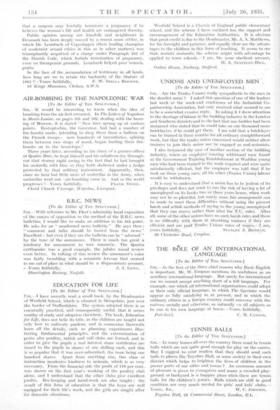UNIONS AND UNEMPLOYED MEN
[To-the. Editor of THE SPECTATOR.] S1R,—Are the Trades 'Union§ really sympathetic to the men in the 'derelict areaS'? rasked this question Of one of the leaders hist week 'at the week-end conference of the Industrial ' Co- partnership Asseciation, 'but only received what seemed to ine to be a somewhat evasive reply. In asking it I drew attention to the shortage OrIaltour in the building induStry in the London and Southern districts'andib the fact that one builder had been instanced who stated that he could take on one thousand more bricklayers, if he Could get them." I am told that a bricklayer can be trained in three months'for all ordinary straightfor*ard work, but that the trades union Concerned would neither allow trainees to join their union nor be engaged as notf-unionists.
I also instanced the caw of another section of the building industry, where an t.t. em iI(Ir wanting additional men found at the Government Training Establishment at Waddon young men who had been trained in the work required and were quite ,satisfactorily eincient, but the employer was told 'that if he took on these young men, all his other (Trades Union) labour would be withdrawn. . .
, It is easy to understand that a union has to be 'jealous of its privileges and does not want to run the risk of having a lot of unemployed on its books two or three years hence, when work
may not be so plentiful, but some fair arrangement can be made to Meet these difficulties without using the present harsh and selfish methods of saying to the young unemployed that they can starve jather than alter the T.U. rules. After all, some of the other unions have no such harsh rules and there is no difficulty with them.in absenbing trainees if' they are efficient and are paid Trades Unions rates of wages.-L-I am,
yours faithfully, STANLEY J. BENIIAM. .20 Chichester Road, Croydon.





































 Previous page
Previous page